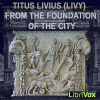Titus Livius - From the Foundation of the City Vol. 01
Titus Livius
100%
Speed
Antiquity
807
Summary
Ab urbe condita, is a monumental history of ancient Rome written in the Latin language by Titus Livius(Livy), an ancient Roman historian. The work covers the time from the stories of Aeneas, the earliest legendary period from before the city's founding in c. 753 BC, to Livy's own times in the reign of the emperor, Augustus. The last year covered by Livy is 745 AUC, or 9 BC, the death of Drusus. About 25% of the work survives.Livy's History of Rome was in demand from the publication of the first packet. Livy became so famous that a man from Cadiz travelled to Rome just to see him, and once he had seen, returned home. The popularity of the work continued through the entire classical period. A number of Roman authors used Livy, including Aurelius Victor, Cassiodorus, Eutropius, Festus, Florus, Granius Licinianus and Orosius.
Livy wrote during the reign of Augustus, who came to power after a civil war with generals and consuls claiming to be defending the Roman Republic. Livy's enthusiasm for the republic is evident from the first pentade of his work, and yet the Julio-Claudian family were as much fans of Livy as anyone. Livy must have been viewed as a harmless and irrelevant advocate of the ancient morality, which was a known public stance of the citizens of Patavium.
During the Middle Ages interest in Livy fell off. Due to the length of the work the literate class were already reading summaries rather than the work itself, which was tedious to copy, expensive, and required a lot of storage space. It must have been during this period, if not before, that MSS began to be lost without replacement.
The Renaissance was a time of intense revival; the population discovered that Livy was being lost and large amounts of money changed hands in the rush to collect Livy manuscripts. The poet, Beccadelli, sold a country home for the money to purchase one manuscript copied by Poggio. Petrarch and Pope Nicholas V launched a search for the now missing books. Laurentius Valla published an emended text initiating the field of Livy scholarship. Dante speaks highly of him in his poetry, and Francis I of France commissioned extensive artwork treating Livian themes; Niccolò Machiavelli's work on republics, the Discourses on Livy is presented as a commentary on the History of Rome. Respect for Livy rose to lofty heights. (Summary adapted from Wikipaedia by Karen Merline.)
Authorization
By logging in, you agree to the terms and conditions.












No comments